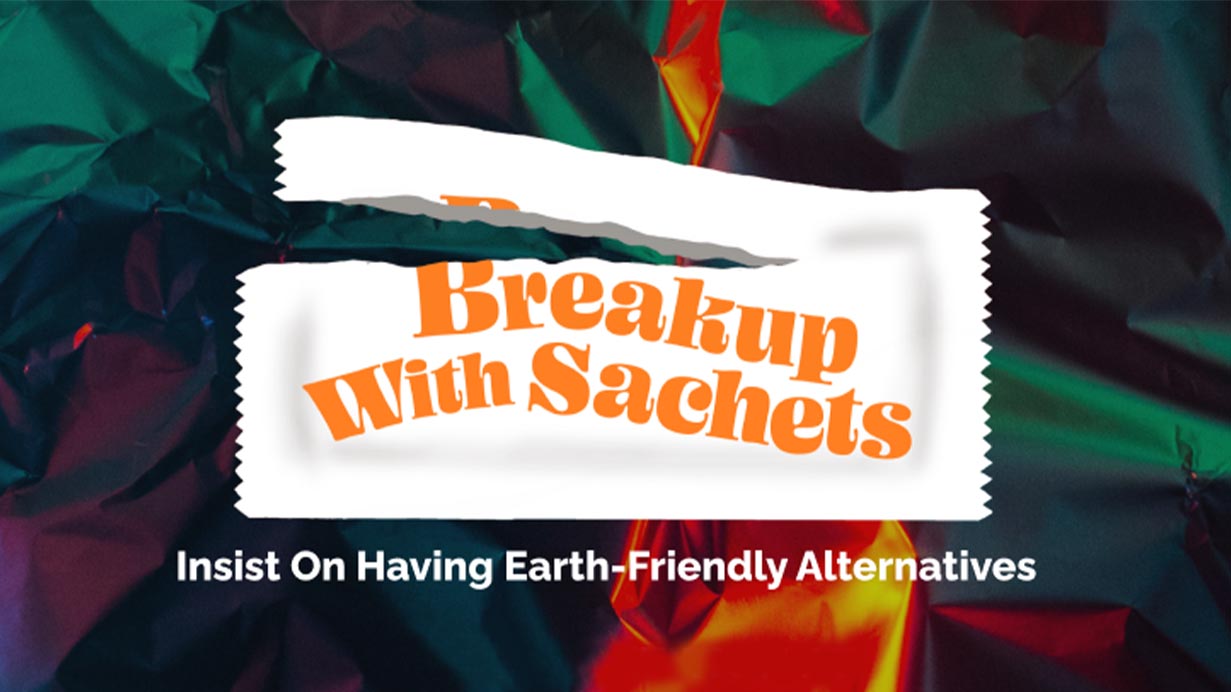Breakup With Sachets, Legalize Mainstream Refilling!
A Public Call for a Sachet-Free Future for Every Filipino

Single-use plastics, mainly sachets, are a pressing concern in the Philippines. In a study by the Global Alliance for Incinerator Alternatives, they comprise an estimated 52% of the country’s total plastic waste.
Around 20% of this enormous amount of plastic ends up in our oceans which risks the health of everyone who consumes seafood, the safety of people living in over 800 coastal communities due to flash floods and contaminated water, and the livelihood of those working for major industries in the country including shipping, fishing, and tourism.
As consumers, we seriously recognize the extensive effect of sachet pollution not just on the environment but also on the overall quality of human life including but not limited to the industries we work in, our communities, our sources of income, our physical health, and the well-being of our families and loved ones.
These are the key reasons why the No Other Year For Plastics (NOYPI) coalition convened by makesense Asia along with 22 partner and ally organizations from private institutions, innovation hubs, sustainability firms, non-profit establishments, and public sector representatives, and over 20,000 Filipino citizens who signed both the Breakup With Sachets and the Mainstream Refilling petitions collectively call on the Food and Drug Administration to pass into law the change in regulations that would legalize mainstream refilling with cosmetic products as a starting point through
- Redefining refilling as a separate activity from manufacturing;
- Establishing the standards for refilling stations including the safety and sanitary requirements; and
- Determining the minimum information that needs to be included on the label of refilled products and the refilling stations.
Initially drafted by Save the Philippine Seas’ Anna Oposa, Filipino social enterprise Human Nature, and 15 other civil society organizations through a petition drafted in 2020, the NOYPI coalition strongly reinforces the need to execute these science-backed recommendations as a starting point to achieving a sachet-free future for the country.
Specifically, we believe that legalizing mainstream refilling starting with cosmetic product distribution will allow us to
- Provide an accessible, affordable, and Earth-friendly alternative to single-use plastics that Filipino consumers can adopt should they want to go sachet-free in their daily household requirements;
- Introduce a more sustainable business model and opportunities for manufacturers as we continue to champion the prevention of sachet production, which will hugely influence the adoption from supermarkets to sari-sari store owners; and
- Advance the mainstream adoption of refill and reuse systems in sari-sari stores where 67% of Filipinos buy their daily household needs.
The recommendation to revisit and revise the existing regulations concerning mainstream refilling for cosmetic products can spark significant change in how Filipino consumers patronize household products including sustainable packaging and enable them a reasonable way to further reduce their plastic footprint in their daily lives. This can also be an opportunity for the Philippine government to further fulfill its commitments in The Paris Agreement concerning climate mitigation and adaptation and for businesses to be able to support this path to sustainability.
We believe that we can make change happen when we take to heart the critical statistics on sachet pollution, consider its human impact, listen to science and the call of those at the grassroots level, and collaborate to find the most affordable, accessible, and sustainable alternatives.
Para sa kalikasan, sa Pilipinas, at sa bawat Pilipino.
Signed:
- Juan Carlos Hechanova, Co-Executive Director for Development, makesense Asia
- Angeli Recella, Co-Executive Director for Programs & Operations, makesense Asia
- Anna Oposa, Co-founder & Executive Director, Save the Philippine Seas
- Anna Meloto-Wilk, Co-founder & President, Human Nature (Gandang Kalikasan Inc.)
- H.E. Michèle Boccoz, Ambassador, The Embassy of France to the Philippines and Micronesia
- Rachel Herrera, Commissioner, Climate Change Commission of the Philippines
- Teodoro “Teddy” Baguilat Jr., former Ifugao Representative and Governor, and environmental activist
- Niner Guiao, Managing Director, Parabukas
- Krisha Ellis, Co-founder, Salin
- Fabien Courteille, Country Director, ACTED
- Dr. Cherry Ringor, Director, University of the Philippines – Institute of Environmental Science
- Dave Albao, Executive Director, Philippine Reef and Rainforest Conservation Foundation Inc.
- Froilan Grate, Philippines Executive Director, GAIA (Global Alliance for Incinerator Alternatives)
- Reynaldo San Juan Jr., Executive Director, Ban Toxics
- Lorafe Lozano, Director of the Center, University of San Carlos CREST (Center for Renewable Energy and Sustainable Technology)
- Jules Coignard, Chief Executive Officer, Circul’r
- Erika Tatad, Director, Xchange
- Priya Thachadi, Founder, Villgro
- Benjamin Villacorte, Partner SGV, SGV & Co. EY Philippines
- June Alvarez, Executive Director, Philippine Center for Environmental Protection and Sustainable Development
- Shawntel Nieto, President, Sustainable PH
- Mary Antonette Flores, Partnership and Communications Manager, Water and Life
- Elvin Uy, Executive Director, Philippine Business for Social Progress
- Leslie Suntay, Head of Strategic Planning, Philippine Transmarine Carriers
- Marie-Anne Lezoraine, Philippines Country Director, Kantar
- Allan Robert Sicat, Executive Director, Microfinance Council of the Philippines
- Carlo Delantar, Program Director, Circulo
- Mayo Alcon, FMCG industry consultant
- Marizu Baser, FMCG industry consultant
Related Event
